Harrison family of Virginia
The Harrison family of Virginia is an American political family whose direct descendants include a Founding Father of the nation, Benjamin Harrison V, and three United States presidents: William Henry Harrison, Benjamin Harrison, and Abraham Lincoln. The Harrisons are among four families to have two presidents in their number with the same surname; the others are the Adams, Roosevelt, and Bush families.[lower-alpha 1] The family's lineage also includes state governors, legislators, mayors, and professionals.
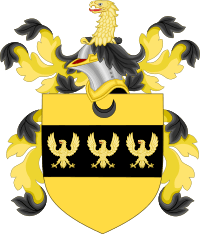

The Virginia Harrison family consists primarily of two branches with origins in northern England. One branch, led by Benjamin Harrison I, journeyed by way of Bermuda to Virginia before 1633 and settled on the James River; they are often referred to as the James River Harrisons. Successive generations of this branch served in the legislature of the Colony of Virginia, including Benjamin V, who was a signatory of the Declaration of Independence and later governor of the Commonwealth. This family branch produced President William Henry Harrison, Benjamin V's son, and President Benjamin Harrison, William Henry's grandson, as well as another Virginia governor, Albertis Harrison; the family also includes two Chicago mayors and members of the U.S. House of Representatives and the U.S. Senate.
The second branch of the Virginia Harrisons emigrated from Britain to New England in 1687 and settled in the Shenandoah Valley of Virginia 50 years later; they were led by Isaiah Harrison. This branch most likely descended from an interim chaplain of the Jamestown Colony, Rev. Thomas Harrison, who was kindred to the James River Harrisons but who returned to England. President Abraham Lincoln descended from the Shenandoah Valley family, which also includes the founders of Harrisonburg and Dayton. This branch as well produced local officials, educators, and physicians, who made groundbreaking contributions in the areas of linguistics, women's advocacy, and transplant surgery.
English origin
Some genealogists indicate that the first Harrisons were Viking warriors of Norse origin, and that they arrived in northeast England with Cnut the Great; others say that they are of Norman, Irish, and Scottish descent. Harrisons settled in Northumberland, Yorkshire, and Durham, all in the north of England. Some in their number used the older spelling "Harryson" ("son of Harry"), although this mostly ended with their arrival in the New World.[1]
The two Virginia Harrison lines share similar coats of arms, both issued in English heraldry. They feature helmets and shields emblazoned by gold eagles on a dark field with supporters. The arms of William Henry Harrison (1773–1841) of the James River Harrisons depict three eagles and are mentioned in the arms of "Harrison of the North", granted in England in 1574, as well as those of "Harrison of London", granted in 1613 with a pedigree dating from 1374. They are often referred to as the "Yorkshire arms". [2]
The "Durham arms" were used by Daniel Harrison of the Shenandoah Valley Harrisons, featuring one eagle and sourced to Harrisons descended from Durham. Included is the crest shoulder gules (red) signaling strength or martyrdom. These arms were first established by the pedigree of Robert Harrison in 1630, showing him to be the grandson of Rowland Harrison of Barnard Castle in Durham. [3]
James River family
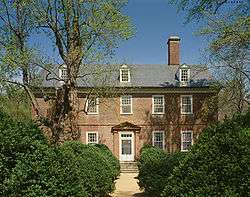
homestead of the James River Harrisons
The history of the James River Harrisons in the Colony of Virginia began in 1630 when Benjamin Harrison I left England for America by way of Bermuda.[4] Author J. Houston Harrison references the tradition, supported by other writers, that Benjamin had four brothers: Thomas, who also ended up in the south, Richard and Nathaniel who were in the north, and Edward who remained in England. [5][6][lower-alpha 2]
The parentage of the brothers is the subject of several different viewpoints. Genealogist McConathy states that the father might have been Richard Harrison, who descended from Rowland Harrison of Durham.[8] McConathy's work also allows that the brothers could have been the sons of Thomas Harrison, Lord of Gobion's Manor (1568–1625), and wife Elizabeth Bernard (1569–1643) of St. Giles, Nottinghamshire, England. [9][10] Still other sources indicate that the father may have been merchant Robert Harrison of Yorkshire.[7][11]
Benjamin Harrison's brother Richard settled in Connecticut Colony, while Nathaniel was in Boston. Thomas (1619–1682) arrived in Virginia in 1640 and was temporarily the minister at Elizabeth River Parish before removing to New England. He most likely was the ancestor of Harrison emigrants to the Shenandoah Valley.[12] Benjamin arrived in Virginia by 1633, as he was installed as clerk of the Virginia Governor's Council in that year. In 1642, he became the first of the family to serve as a legislator in the Virginia House of Burgesses.[13] His son Benjamin II (1645–1712) served as county sheriff and in the House of Burgesses, and also was appointed to the Governor's Council, the upper house of the Colony's legislature.[14][lower-alpha 3]
The second Benjamin in turn fathered Benjamin Harrison III (1673–1710) who similarly was drafted for public service and leadership, first as acting attorney general, then treasurer of the Colony and Speaker of the Burgesses. He acquired Berkeley Hundred.[15] Benjamin Harrison IV (1693–1745) became a member of the House of Burgesses, but he did not otherwise pursue politics. He married Anne Carter (1702–1745), daughter of Robert "King" Carter (1662/63–1732), and built the family homestead Berkeley Plantation.[16][lower-alpha 4]
"The Signer" and two presidents
Benjamin Harrison V (1726–1791) followed his father serving in the House of Burgesses, and then became known in the family as "the Signer" of the Declaration of Independence, from his representation of Virginia in the First and Second Continental Congresses. He was chosen Chairman of the Congress' Committee of the Whole and therefore presided over final deliberations of the Declaration. [4]
He was a rather corpulent and boisterous man; Delegate John Adams referred to him variously as the Congress' "Falstaff", and as "obscene", "profane", and "impious", although he allowed that "Harrison's contributions and many pleasantries steadied rough sessions" and also that Harrison "was descended from one of the most ancient, wealthy and respectable Families in the ancient dominion."[4] The genuine and mutual enmity between Adams and Harrison stemmed from Adams’ upbringing in aversion to human pleasures and Harrison's appreciation for storytelling, fine food, and wine. There was also a political distaste between them—Adams was too radical for Harrison and the latter was too conservative for Adams. The two therefore had distinctly opposing congressional alliances—Harrison with John Hancock and Adams with Richard Henry Lee.[4]
%2C_by_John_Trumbull.jpg)
Harrison was a friend and confidant of fellow-Virginian George Washington; in 1775 he joined Benjamin Franklin and Thomas Lynch on a select committee to help the newly appointed General Washington secure much needed enlistments and supplies for the Continental Army. [4][lower-alpha 5] Harrison also served on the Board of War with Adams, Roger Sherman, James Wilson, and Edward Rutledge, and on the Committee of Secret Correspondence with Benjamin Franklin, Thomas Johnson, John Jay, Robert Morris, and John Dickinson[4]
Pennsylvania Delegate Benjamin Rush years later recalled the Congress’ atmosphere during a signing of the Declaration on August 2, 1776; he described a scene of “pensive and awful silence” which he said Harrison singularly interrupted, when delegates filed forward to inscribe what they thought was their ensuing death warrant. Rush related that, just before signing the Declaration, Harrison turned to the diminutive Elbridge Gerry of Massachusetts and said, "I shall have a great advantage over you, Mr. Gerry, when we are all hung for what we are now doing. From the size and weight of my body I shall die in a few minutes and be with the Angels, but from the lightness of your body you will dance in the air an hour or two before you are dead."[19]
Harrison's family indeed experienced retaliation from the British, like many others, for his role in the revolution. Benedict Arnold and his forces pillaged many plantations, including Berkeley, with the intent of obliterating all images of the treasonous families. In January 1781, the troops removed every family portrait from Harrison's home and made a bonfire of them. Benjamin V later returned to the House of Burgesses and was elected Governor of Virginia (1781–1784).[20][lower-alpha 6]
His brother Nathaniel served as sheriff of Prince George County and in the House of Delegates as well as the Senate; he later settled in Amelia County.[21] Nathaniel's son Edmund served as Speaker in the House.[22]
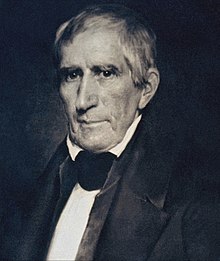
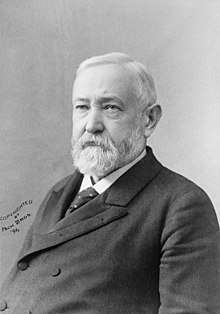
The "Signer's" son Benjamin Harrison VI (1755–1799) was for a time a successful businessman and also served in the Virginia House of Delegates. His brother was General William Henry Harrison who was also born at Berkeley, and served as a congressional delegate for the Northwest Territory; he was appointed in 1800 as Governor of the Indiana Territory, and served in the War of 1812.[23][24] In the 1840 presidential election, William Henry defeated incumbent Martin Van Buren, but fell ill and died just one month into his presidency; Vice President John Tyler, a fellow Virginian and neighbor, succeeded him.[23] William Henry was the father of Ohio Congressman John Scott Harrison (1804–1878) who was the father of Benjamin Harrison (1833–1901), a brigadier general in the Union Army during the American Civil War.[25] Benjamin also served in the U.S. Senate (1881–1887) and was elected president in 1888 after defeating incumbent Grover Cleveland.[26] According to his national obituaries, Albertis Harrison (1907–1995) was another descendant; he served in the Virginia Senate (1947–1957), was then elected Attorney General of Virginia (1957–1961) and later Governor (1962–1966). He was finally appointed Justice of the Virginia Supreme Court (1968–1981).[27][28]
Harrisons in the Shenandoah Valley
The Harrisons who settled in the Shenandoah Valley in the 1730s came from New England and most likely had common ancestry with the James River family; they probably descended from Benjamin Harrison I's brother Thomas (1619–1682). He led a parish at Elizabeth River at age 21, and was appointed by Governor William Berkeley as an acting chaplain of the Jamestown Colony.[29]
Rev. Thomas Harrison
Thomas earned his B.A. from Sidney Sussex College, Cambridge in 1638, then sailed to Virginia in 1640.[11] He was a Puritan and left his parishes and his chaplaincy at Jamestown following the 1644 Indian Massacre there. He moved to Boston near his brothers, married Dorothy Symonds, and later repatriated to England. In 1650, he had a parish at St. Dunstan-in-the-East, London, and joined the English Puritans. In 1655, then a widower, he became the Chaplain for Henry Cromwell, accompanied him to Ireland, and there resided with the Governor and his family.[7]
Thomas also formed a close friendship with famed author and cleric, Bishop Jeremy Taylor. Taylor biographer Edmund Gosse indicated that Thomas "was rewarded by Governor Cromwell's confidence, and his advice was often asked for and acted upon. When in 1658 he published his extremely popular manual of piety, Topica Sacra, he was the most popular divine in Ireland."[7] Topica Sacra publicized Thomas as a robust and forceful cleric of his time. In an age of piety, the book invokes Job's insistence upon God's answers. Thomas was likewise confrontational in his prayers and, according to Gosse, was willing to "catechize" God for insight into His words. Thomas’ work was dedicated to Cromwell and was reprinted on its centennial.[7]
In 1659, he married Katherine Bradshaw and resided in Chester, England. He later settled in Dublin and probably fathered a son named Isaiah in 1666, who was the patriarch of the Virginia Harrisons of the Shenandoah Valley. Thomas died in Dublin in 1682.[30]
J. Houston Harrison cites historian John Peyton who contended that the Valley Harrisons instead descended from Major General Thomas Harrison (1616–1660) who was born in the same year as the Reverend and whose wife was also named Katherine. The General participated in the regicide of King Charles I of England, and was therefore hanged, drawn and quartered in 1660. The Reverend's position as a non-conformist would have made them allies concerning the monarchy, which adds to the confusion of their identities. But no record is found at the Herald's College showing a pedigree and succeeding coat of arms for the General's family, as in the case of the Reverend. Also, no other lineage to the General has been adequately shown, and the notion is therefore discredited.[31]
Isaiah and another president
The strongest evidence (though circumstantial for lack of a birth record) is that Reverend Thomas Harrison was the father of Isaiah Harrison (1666–1738), who was born in Dublin at the time of Thomas' residence and marriage there. Thomas' use of the name Isaiah for his son was highly atypical—the name is otherwise non-existent in family records to that time. However the name was quite in keeping with Puritan and non-conformist beliefs with which Thomas identified.[32][lower-alpha 7]

Isaiah may well have sailed from Dublin for New York in 1687, on the ship The Spotted Calf. His departure, following his father's death, was also a timely consequence of his father's position as a non-conformist. Isaiah Harrison is definitively shown at Oyster Bay on Long Island in 1687—this is the very same area from which his father Thomas had departed on his return to England forty years earlier.[33] The family of Richard Harrison lived just across Long Island Sound in New Haven, Connecticut. Richard arrived in Connecticut in 1644 and was Isaiah's uncle. John Harrison is shown in Flushing in 1685, and Samuel at Gloucester, New York in 1688.[31] There are records in Dublin which show Thomas' consistent and very unique spelling of Harrison with the double "s", not otherwise found in Ireland or England. Isaiah and his children utilized this same spelling in their American court records.[32][34]
Isaiah's first wife was Elizabeth Wright, with whom he had five children: Isaiah (b.1689), John (1691–1771), Gideon (1694–1729), Mary (1696–1781), and Elizabeth (b.1698). Wife Elizabeth died shortly after the birth of her youngest. Isaiah married Abigail Smith in 1700 and they had five children:[lower-alpha 8] Daniel (1701–1770), Thomas (1704–1785), Jeremiah (1707–1777), Abigail (1710–1780), and Samuel (1712–1790). The family lived at Oyster Bay for 14 years, then moved to Smithtown, New York near the Nissequogue River on Long Island, and remained for 19 years. They moved to Sussex County, Delaware in 1721, where Isaiah acquired the Maiden Plantation near the town of Lewes, and daughter Abigail married Alexander Herring (1708–1780).[35]
The Harrison family moved to the Valley of Virginia in 1737 via Alexandria, and camped in the Luray area while waiting for their land grants to be finalized. Isaiah died in 1738 and was buried on the banks of the Shenandoah River. Son Daniel made the family's first Virginia land acquisition in 1739 in Rockingham County, and he and brother Thomas founded the towns of Dayton and Harrisonburg respectively.[31] Brother John settled at Great Spring, and Samuel settled at nearby Linville. Daniel used the "Durham arms" as his seal for the legal documents in Rockingham.[36]

Abigail Harrison and her husband Alexander Herring settled at Linville also. Their daughter Bathsheba (1742–1836) married Captain Abraham Lincoln (1744–1786), also of Linville, and they had son Thomas (1778–1851) who married Nancy Hanks (1783–1818).[37][38] They gave birth to Abraham Lincoln (1809–1865) who became president in 1860.[37][38] In his brief autobiography, Lincoln had his own take on his Virginia family roots: "My parents were both born in Virginia of undistinguished families... [m]y paternal grandfather, Abraham Lincoln, emigrated from Rockingham County, Virginia...."[39]
During his final years as a prairie lawyer Lincoln's reputation was elevated in the lead-up to his presidential campaign by his success in a sensational murder trial involving a Harrison relative.[40] Lincoln in 1859 represented his third cousin Simeon Quinn “Peachy” Harrison.[lower-alpha 9] Peachy was as well the grandson of a political rival, Rev. Peter Cartwright.[42] Harrison was charged with the murder of Greek Crafton, whom he mortally wounded with a knife after suffering repeated assaults by Crafton. As Crafton lay dying of his wounds, he confessed to Cartwright that he was responsible for provoking Harrison. Lincoln called Cartwright to testify as to the confession but the judge initially denied its use as inadmissible hearsay. Lincoln succeeded in obtaining an acquittal after arguing with the judge, to the point of risking contempt, but ultimately convincing him to admit the testimony and confession as a dying declaration.[40]
Local officials, politicians, educators, and physicians
Daniel Harrison served as a Captain in the French and Indian War and later as a deputy sheriff in Augusta County. Brother Thomas was a lieutenant in that conflict. Daniel's son “Col. Benjamin” (1741–1819) was a regimental commander in the Virginia Militia during the revolution, and then was elected to the Virginia House of Delegates.[43]
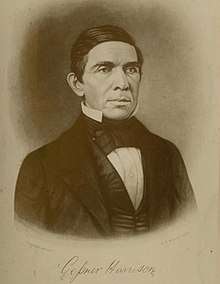
Among their descendants were physicians and educators, including Benjamin's son, Peachy Harrison (1777–1848), the great-uncle and namesake of Lincoln's aforementioned client; in addition to his medical practice he was county sheriff and served as well at the House of Delegates, the Virginia Senate, and the state's Constitutional Convention.[44] The latter's son, Dr. Gessner Harrison (1807–1862), graduated with an M.D. and LL.D. from the University of Virginia, and in 1828 was appointed by the school's rector, James Madison, as a professor. He was highly regarded in the classics and linguistics, and served as faculty chairman. The devout Gessner is also remembered for declining Thomas Jefferson’s invitation to Sunday dinner at Monticello, saying it would represent a desecration of the sabbath. Jefferson promptly commended him for his "filial piety" and arranged it for another evening. Gessner's family became a fixture in Jefferson's “Academical village.”[45]
Gessner married Prof. George Tucker’s daughter Eliza, and their daughter Mary Stuart (1834–1917) married Prof. Francis Smith. She became a noted author and translator at the university; she was also among the nation’s early advocates for women’s rights, speaking on behalf of Virginia women in Chicago at the 1893 World’s Congress of Women.[46][lower-alpha 10] Mary Stuart’s daughter, Rosalie Smith (1870–1956), married a descendant of the James River family, Dr. Isaac Carrington Harrison (1870–1949), the first of three by that name to take an M.D. at the university.[48] His son J. Hartwell Harrison (1909–1984) became a professor of surgery at Harvard University, and chief of the Urology Dept. at Peter Bent Brigham Hospital. He was a member of the surgical team which in 1954 brought kidney transplantation to the world; his primary role was surgeon for the donor. He later was the Editor-in-chief of the textbook Campbell's Urology.[49]
Slavery involvement
Both of the Virginia Harrison families owned and traded slaves, whose treatment at their hands was at times inhumane and characteristic of the institution. Biographer Clifford Dowdey states that “...among the worst aspects is the presumption that the men in the Harrison family, most likely the younger, unmarried ones, and the overseers, made night trips to the slaves’ quarters for carnal purposes.”[50][lower-alpha 11] Though it is known that Benjamin Harrison V owned mullatoes, no record has been revealed as to parentage.[52] As with all planters, the Harrisons were able to provide for the slaves' sustenance on their plantations. Dowdey further portrays the Harrisons' incongruity, saying the slaves in some ways "...were respected as families, and there developed a sense of duty about indoctrinating them in Christianity, though there was a diversity of opinion about baptizing children who were property.”[50] Dowdey adds that, “[I]n all divisions of slaves, Benjamin IV specifically forbade the splitting up of slave families."[50] This was eventually compromised by the ever-widening distribution of estates, as primogeniture waned.
The families generally abandoned their slaveholding as the abolitionist movement took hold.[50] Future President Benjamin Harrison began his political career in Indiana and joined the fledgling Republican party in 1856, then being built in opposition to slavery.[53] Abraham Lincoln similarly joined that party, and is credited with presidential efforts to end slavery by his Emancipation Proclamation, the victory of his Union army in the Civil War, and his promotion of the Thirteenth Amendment to the U.S. Constitution.[54]
Other Harrison lines in Virginia
In addition to the James River and Shenandoah families, there were other Harrison families, one from Prince William County founded by Burr Harrison (1637– ?) originally of Westminster, England. This line includes Virginia House delegates and a judge. Another line from York County begins with Richard Harrison (1600–1664) from Essex, England.[55]
Legacies
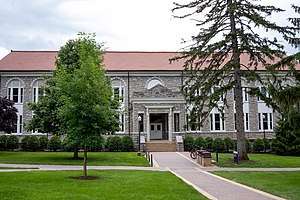
Benjamin IV's Berkeley Plantation in Charles City County, Virginia became an icon of the Harrison family in Virginia. Other historic Virginia homes of the family include Brandon Plantation, Upper Brandon, Hunting Quarter, The Oaks, The Wigwam, Four Mile Tree, and Kittiewan.[56]
The Benjamin Harrison Memorial Bridge is a drawbridge along Virginia State Route 5 and the Virginia Capital Trail across the James River, named in honor of "the Signer". Fort Benjamin Harrison near Indianapolis, Indiana was named for President Benjamin Harrison, who was born in Ohio.[56] The Shenandoah Harrisons also lent their names to Harrison Hall at James Madison University, Daniel Harrison House in Dayton, and memorials at the University of Virginia.[57]
Other family public servants
Chicago Mayors
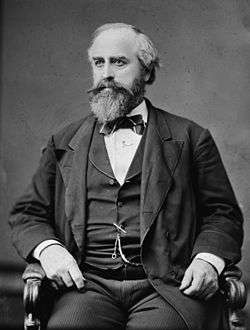
(1879–87; 1893)
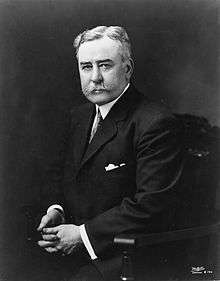
(1897–1905;1911–15)
- Carter Henry Harrison I (1736–1793), son of Benjamin Harrison IV, Virginia House delegate
- Carter Bassett Harrison (1752–1808), son of Benjamin Harrison V, member of the Virginia General Assembly, Representative from Virginia (1793–99)
- Burwell Bassett (1764–1841), first cousin of William Henry Harrison, Virginia House delegate (1787–89 and 1819–21), Virginia state senator (1794–1805), Representative from Virginia (1805–13, 1815–19, and 1821–29)
- Russell Benjamin Harrison (1854–1936), son of President Benjamin Harrison, Indiana Representative (1921–25), Indiana State Senator (1925–33).
- Carter Harrison Sr. (1825–1893), Mayor of Chicago (1879–1887)
- Carter Harrison Jr. (1860–1953), Mayor of Chicago (1897–1905; 1911–1915)
- William Henry Harrison III (1896–1990), son of Russell Benjamin Harrison, Wyoming State Representative (1945–50), Representative from Wyoming (1951–55, 1961–65, and 1967–69)
- Henry Benjamin "Happy" Harrison (1888–1967), great-grandson of John Scott Harrison, postmaster of La Porte, Texas (1930), mayor of La Porte, Texas (1934–1936), and founding member of La Porte fire brigade; married Grace Yarborough, sister of Texas senator Ralph Yarborough
Notes
- While presidents Andrew Johnson and Lyndon B. Johnson share a surname, no familial connection is known.
- Historian Francis Burton Harrison suggests that there was no relationship between Thomas and Benjamin, but supporting evidence is lacking.[7]
- Virginia historian and biographer Clifford Dowdey states that none of the successive Benjamins used the numerical suffix; it is employed by historians as a convenient tool for distinguishing them.
- The Harrison homestead is also the site where, on December 3, 1619, there occurred one of the nation’s first recognized observances of a day of thanksgiving.[17][18]
- After George Washington was named to lead the army, Adams complained there was an attempt by the Harrison-Hancock faction to undermine him and Lee in the eyes of the new commander. [4]
- In 1788 Benjamin V joined Patrick Henry, George Mason, and John Tyler in opposing ratification of the Federal Constitution, and was thereby irreparably estranged from Washington.[4]
- Though Thomas' last will and testament of 1682 makes no mention of Isaiah, it omits as well his eldest son Thomas, born in Chester in 1661.[7]
- J. Houston Harrison's reference to Abigail's maiden name of Smith indicates an uncertainty but no detail is offered.
- Peachy also descended from Isaiah Harrison, through Isaiah’s son Daniel.[41]
- The Women’s Congress was part of the Chicago World’s Fair, the closing ceremonies of which were cancelled due to the assassination of five-term mayor Carter Harrison, Sr. of the James River family.[47]
- Dowdey’s award-winning work concentrated on colonial and Civil War history.[51]
References
- Harrison, J. Houston, pp. 77–78.
- Harrison, J. Houston, pp. 78–80.
- Harrison, J. Houston, pp. 80–83.
- Smith 1978.
- Harrison, J. Houston, pp. 88–89.
- Keith, p. 43.
- Harrison, Francis Burton 1945.
- McConathy.
- Harrison, J. Houston, pp. 79–80.
- Harrison, Francis Burton 1946.
- "Thomas Harrison". University of Cambridge. Retrieved December 10, 2019.
- Harrison, J. Houston, p. 91.
- Dowdey, p. 52.
- Dowdey, p. 98.
- Dowdey, p. 115.
- Dowdey, p. 146.
- Dowdey, pp. 29–37.
- "John F. Kennedy XXXV President, Thanksgiving Proclamation, Nov. 5, 1963". The American Presidency Project. Retrieved November 28, 2019.
- "Benjamin Rush to John Adams, July 20, 1811". NPS. Retrieved November 22, 2019.
- Dowdey, pp. 263–264.
- "Encyclopedia Virginia". Library of Virginia. Retrieved November 26, 2019.
- "Edmund Harrison to Thomas Jefferson, December 30, 1802". National Archives. Retrieved January 12, 2017.
- Dowdey, pp. 291–315.
- Gugin & St. Clair, p. 18.
- Bruce, p. 229.
- Calhoun, pp. 7–8.
- New York Times, "Albertis S. Harrison Jr., 88, Dies; Led Virginia as Segregation Fell", January 25, 1995
- "Albertis S. Harrison Dies at 88". The Washington Post. January 25, 1995. Retrieved July 8, 2020.
- Harrison, J. Houston, p. 88.
- Harrison, J. Houston, pp. 101–105.
- Harrison, J. Houston, pp. 10–15.
- Harrison, J. Houston, p. 99.
- Harrison, J. Houston, pp. 89–93.
- Hood, p. 449.
- Harrison, J. Houston, pp. 42–55, 123.
- Harrison, J. Houston, p. 128.
- Wayland, pp. 24–57.
- Harrison, J. Houston, pp. 280–286, 350–351.
- Lincoln, Abraham.
- Dekle.
- Harrison, J. Houston, p. 480.
- "The Grisly Murder Trial That Raised Lincoln's Profile". History Channel. Retrieved March 26, 2020.
- Harrison, J. Houston, pp. 200, 204, 296.
- Harrison, J. Houston, p. 396.
- "Gessner Harrison". University of Virginia Library. Retrieved Feb 18, 2018.
- Willard.
- Larson.
- Harrison, J. Houston, p. 156.
- Murray, Joseph E. (1990). "Nobel Lecture: The First Successful Organ Transplants in Man". Nobel Foundation. Retrieved December 13, 2019.
- Dowdey, p. 164.
- "Coski, Ruth Ann, "Clifford Shirley Dowdey (1904–1979), Dictionary of Virginia Biography". Library of Virginia. 2015. Retrieved December 8, 2019.
- "To Geo. Washington from Benj. Harrison,Sr., March 31, 1783". National Archives. Retrieved February 19, 2020.
- Moore & Hale, 2006, p. 29
- "Abraham Lincoln". Encyclopedia Brittanica. Retrieved December 20, 2019.
- Harrison, J. Houston, pp. 287–289.
- Dowdey, pp. 270–315.
- Harrison, J. Houston, pp. 478–556.
Works cited
- Bruce, Philip A., The Virginia Magazine of History and Biography, Virginia Historical Society, Vol. 2, No. 3, Jan. 1895.
- Calhoun, Charles William (2005). Benjamin Harrison. Macmillan. ISBN 978-0-8050-6952-5.CS1 maint: ref=harv (link)
- Dekle, George R. "Abraham Lincoln's Last Murder Case:News Reports". Illinois State Register & Illinois State Journal. Retrieved January 29, 2020.
- Dowdey, Clifford, "The Great Plantation", Rinehart & Co., 1957
- Gugin, Linda C.; St. Clair, James E., eds. (2006). The Governors of Indiana. Indianapolis: Indiana Historical Society Press and the Indiana Historical Bureau. ISBN 0-87195-196-7.CS1 maint: ref=harv (link)
- Harrison, Francis Burton, "Rev. Thomas Harrison, Berkeley's 'Chaplain'", Virginia Historical Society, Vol. 53, No. 4, Oct. 1945, pp. 302–311 [kinship is noted].
- Harrison, Francis Burton, "Benjamin Harrison of Gobions Manor”, Virginia Historical Society, Vol. 54, No. 4, Oct. 1946 [kinship is noted]
- Harrison, J. Houston (1935). Settlers by the Long Grey Trail. Joseph K. Ruebush Co.. [The author's kinship is noted; an extensive bibliography (pp. 619–627) is also noted, as well as a heavy reliance upon public records.]
- History.com Editors. "U.S. Presidents–Benjamin Harrison". A & E Television Networks. Retrieved February 18, 2019.
- Hood, Dellman O., The Tunis Hood Family: Its Lineage and Traditions, Metropolitan Press, 1960
- Keith, Charles P., “Ancestry of President Benjamin Harrison”, Lippincott Co., 1893
- Larson, Erik. The Devil in the White City: Murder, Magic, and Madness at the Fair That Changed America. New York: Vintage Books a Division of Random House, Inc., 2003.
- Lincoln, Abraham. "Short Autobiography, 1859". The History Place. Retrieved December 21, 2019.
- McConathy, Ruth H., Supplement to the House of Cravens, University of Wisconsin, 1972
- Smith, Howard W., "Benjamin Harrison and the American Revolution". Edward M. Riley, editor. Virginia Independence Bicentennial Commission, 1978.
- Moore, Anne Chieko; Hale, Hester Anne (2006). Benjamin Harrison: Centennial President. Nova Publishers. ISBN 978-1-6002-1066-2.
- Smith, Mary Stuart (1893). Eagle, Mary K. O. (ed.). The Congress of Women: The Virginia Woman Today. Philadelphia: S. I. Bell. pp. 410–411.CS1 maint: ref=harv (link)
- Wayland, John W. (1987). The Lincolns in Virginia. Harrisonburg: C.J. Carrier.CS1 maint: ref=harv (link)
- Willard, Frances Elizabeth (1893). A Woman of the Century: Fourteen Hundred-seventy Biographical Sketches Accompanied by Portraits of Leading American Women in All Walks of Life (Public domain ed.). Moulton. p. 669. Retrieved November 27, 2019.CS1 maint: ref=harv (link)
